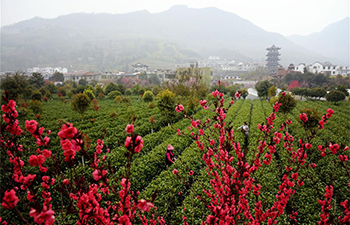RIO DE JANEIRO, March 25 (Xinhua) -- The construction of a new port in Sao Luis, capital of northeastern Brazil's Maranhao state, gives both local officials and Chinese companies something to cheer about.
A ceremony held last week has laid the cornerstone of the construction of the port, which is expected to boost trade between Brazil and China. The celebration gathered officials and representatives of the companies in charge of the project: China Communications Construction Corporation (CCCC) and Brazilian groups WPR and Lyon Capital.
To spur agribusiness, the project is expected to inject new life into Sao Luis, one of Brazil's busiest industrial transport hubs.
Take Herun Group, a company that stores and transports agricultural goods, for example. Operating in Brazil since 2003, Herun joined the project in its early stages. Once the port is completed, the company will buy grains directly from producers and ship products to China.
According to Yu Songbo, president of Herun Group, the company has four cargo ships at the ready, capable of carrying up to 180,000 tons of grain, Sao Luis Port's maximum capacity.
"When the Port of Sao Luis is completed, there will be a new bridge between Brazil and China. Our 180,000-ton ships will greatly reduce the cost of transportation, which will lead to higher profits for Brazilian farmers and cost reductions for Chinese consumers," Yu said.
Even though the company has no headquarters in Brazil as yet, it has already traded some three million tons of soybeans every year.
China has been Brazil's largest trade partner since 2009. Soybeans are one of the main products Brazil exports to China.
Last year, China imported nearly 51 million tons of grains, 33.3 percent more than that of 2016. That figure is expected to surpass 100 million tons in 2018.
Other Latin American countries are also major grain producers. Brazil could serve as a shipping point for them as well.
"The Herun Group has been analyzing logistical issues and agribusiness in Brazil for several years," Yu told Xinhua.
"Since 2003, we have been strengthening exchange with local farmers and Brazilian agricultural companies, and in the process we discovered that Brazilian companies have great development potential, but (it) need new markets. So we hope to mature our contacts and ensure there is an increase in profits in the most effective way for everyone," Yu said.
Founded in 1979, the Herun Group operates in the grain and oil processing industries, as well as logistics with a focus on grains, including the management of grains at port and shipping to foreign markets. In 2017, the group ranked 113th among China's 500 largest private companies.
Participating in the Sao Luis Port project with CCCC marks Herun's first time to cooperate with a Chinese state-owned company. They believe in the prospects after the port is established.
"Today in Brazil, we buy soybeans from traditional traders like ADM and Bunge. But we are planning for the future and seeking to establish a company in Brazil. In the process, we could also build an industrial park in the country and buy agricultural products directly from Brazilians," Yu said.
The 800 million Real (241 million U.S. dollar) project, representing the most important Brazilian port near the Panama Canal when completed, calls for six berths, four of which are already in the first phase.
The port is expected to be operational in four years, with an annual capacity of handling 10 million tons, of which, seven million in grain.
Maranhao Governor Flavio Dino said the state has great potential in agriculture, beyond soybean, corn and cotton.
Nowadays, most agricultural products from Brazil are transported by highway to ports in southeastern and southern parts of the country. They will then be loaded on ships that travel along the eastern and northern coasts of South America until they reach the Panama Canal. The trip usually takes more than 10 days.
Several Chinese industry giants are already operating in Brazil, such as China's state-owned COFCO International, which deals in agricultural negotiation and processing.
Large private Chinese companies have also set their sights on Brazil. Dakang Agriculture Group is one of them. In 2016, it acquired a local agricultural business in the west-central state of Mato Grosso for more than 200 million U.S. dollars.
The construction of the Brazilian port is the first step to bolstering infrastructure in Latin America and promoting trade between the two regions, according to the Herun Group.
"Latin America has rich coastal resources, excellent water conditions and fewer natural disasters, which is conducive to the development of oil products and logistics industries," Yu said.
"It is an excellent choice for the development of Herun Group's oil and grain logistics and processing industry. Brazil and its neighboring countries Argentina and Uruguay are as important as Chile and Peru among others," Yu said.

















